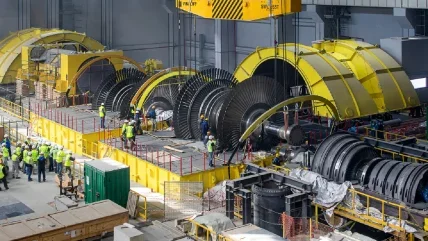
Türkiye’s Akkuyu nuclear power plant (NPP), currently being developed in collaboration with Russia’s state-owned entity Rosatom, is set to become partially operational in 2025.
Located in the southern province of Mersin, the Akkuyu nuclear power plant (NPP) will feature four advanced Russian-designed VVER-1200 reactors.
The construction on the power plant began in 2018, with the first reactor set to become operational in 2025 and full operation across all reactors expected by 2028.
With a total capacity of 4,800MW, it is expected to address 10% of Türkiye’s electricity demand and reduce 18 million tonnes of CO2 emissions each year, once completed.
Akkuyu NPP would provide electricity to more than 12 million consumers, including civil and industrial infrastructure facilities, in more than 10 provinces of Türkiye.
According to China’s state-operated news agency Xinhua Net, Türkiye has shifted to nuclear energy as part of its clean energy strategy and efforts to achieve net-zero emissions by 2053.
The government plans to establish at least two more nuclear power plants by 2050, one in the Thrace region and the other in the Black Sea province of Sinop.
It has been significantly investing in renewables, with plans to allocate $100bn by 2035 and increase its wind and solar capacity fourfold, reaching 120,000 MW by 2035.
The government is also planning to triple its interconnection capacity with the European Union (EU), targeting 77% of its electricity from domestic and renewable sources by 2035.
Also, several small modular reactors with a combined capacity of 5,000MW are in the pipeline to further diversify the country’s energy mix, according to the Xinhua report.
Istanbul-based energy expert Murat LeCompte told Xinhua: “The Akkuyu plant represents not just a shift toward energy diversification but also a step toward reducing Türkiye’s reliance on carbon-intensive fuels.
“Nuclear energy is practical and effective because the amount of energy it provides is incomparable with other sources such as coal.”






